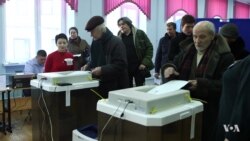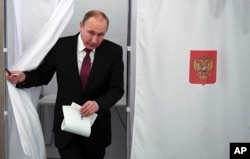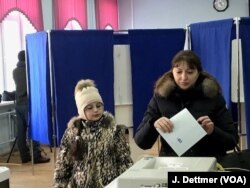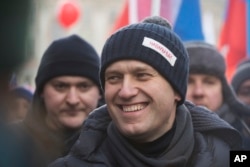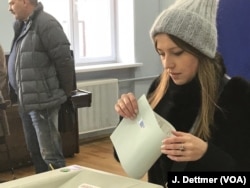Early results and exit polls in Russia say President Vladimir Putin has won a fourth term in office, winning more than 75 percent of the vote.
Opinion polls showed he had far more support than any of his rivals, who ran the gamut from far-right populist to far-left communist.
Putin has been in a position of leadership in Russia for 18 years.
Early results and exit polls in Russia say President Vladimir Putin has won a fourth term in office, winning more than 75 percent of the vote.
Opinion polls showed he had far more support than any of his rivals, who ran the gamut from far-right populist to far-left communist.
Putin has been in a position of leadership in Russia for 18 years.
He addressed thousands on the Manezhnaya Square near the Kremlin late Sunday. He hailed those who voted for him as a "big national team,'' adding that "we are bound for success.''
Asked if he would seek the presidency again in 2030, the 65-year-old Russian leader snapped, "It's ridiculous. Do you think I will sit here until I turn 100?''
Putin faced seven challengers but no real threats from any of the contenders. Each of the other candidates — a reality television star and an ultranationalist among them — was expected to draw very few ballots.
Sunday's election spanned 11 time zones, starting with the Far East and ending with the Baltic enclave of Kaliningrad. Nearly 109 million people were registered to cast ballots. State-owned polling company VCIOM projected a 71 percent turnout.
Yet, the Russian nongovernmental research organization, Levada Center, conducted a survey in December that indicated 58 percent of voters planned to boycott the elections.
Putin's closest rival was opposition leader Alexei Navalny, who was disqualified from running in the election when he was convicted for embezzlement in December. Given a five-year suspended sentence, Navalny said the conviction was politically motivated, to keep him out of the race.
Navalny led the boycott effort, while Russian election organizers hoped for a high voter turnout to legitimize an election long seen to have been a foregone conclusion.
In Crimea, the territory Russia said it annexed from Ukraine, a few European politicians who are friendly with Putin acted as election observers. The European Union and Organization for Security and Cooperation in Europe refused to send election monitors to Crimea, fearing it would be seen to legitimize the Russian occupation.Opposition leader Navalny told VOA's Russian service on Thursday that Putin's observers in Crimea were political cronies, not objective observers. Among them are Andreas Mauere of the German far-left party Die Linke, and Hendrik Weber, founder of a Norwegian public organization called People Diplomacy Norway.
"All those so-called "European observers -- they are as much observers as other candidates in these elections are 'rivals' to Putin," Navalny told VOA. "Of course, this is an absolute fake. It's ridiculous and unpleasant to look at how Putin corrupted and turned into his puppets a significant part of the European establishment."
Putin has been in power as either president or prime minister since 1999. He has switched back and forth between the two roles to circumvent a Russian law banning him from serving more than two consecutive terms as president.
VOA Russian service and Fern Robinson contributed to this report.




